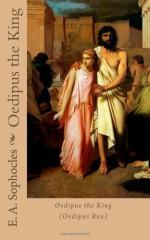|
This section contains 10,236 words (approx. 35 pages at 300 words per page) |

|
SOURCE: “Oral Composition in the Oedipus Tyrannus of Sophocles,” in New Literary History, Vol. 16, No. 1, Autumn, 1984, pp. 175-97.
In the following essay, Havelock describes elements of oral composition that can be found in the text of Oedipus Tyrannus.
A stage play is by definition composed for performance by action and elocution. To argue for “oral” composition may seem to be arguing for the obvious. The “orality” of Greek drama, however, if it exists, goes deeper than a mere management of stage conventions. It would mean that what had to be spoken on the Greek stage in the fifth century before Christ was molded in a very special way. There are of course compositional rules common to all drama qua drama. But I shall argue that there were certain rules operating in classic Greek drama which were peculiar to it, and which stage production of later periods from the...
|
This section contains 10,236 words (approx. 35 pages at 300 words per page) |

|


